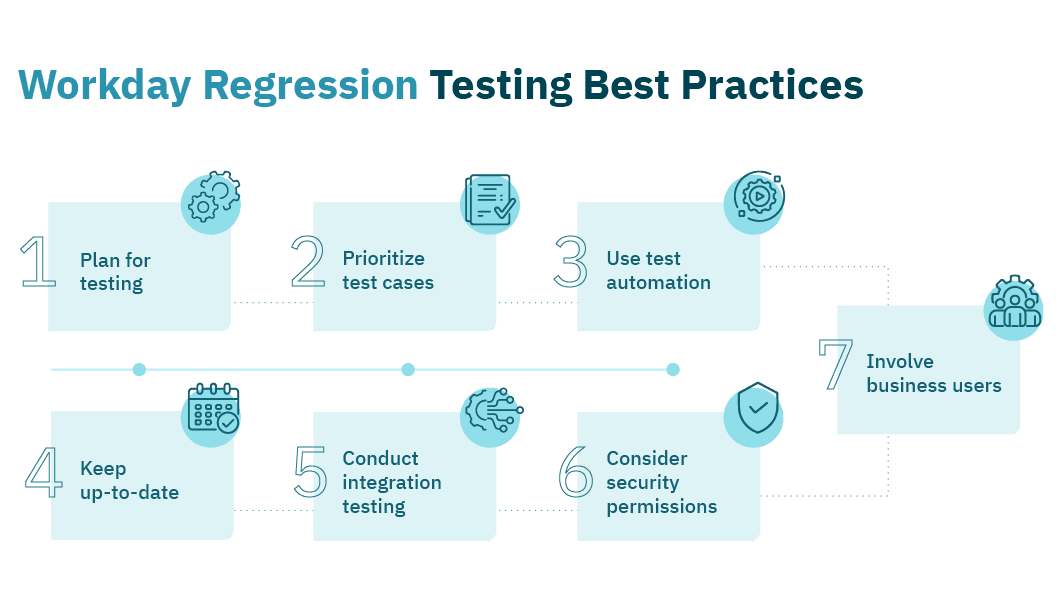We all understand that Workday releases major updates to its cloud-based human resources and financial management software. But did you know that Workday regression testing has become increasingly important? By regularly testing new releases and updates, businesses can reduce the risk of software bugs and ensure that their day-to-day operations continue to run smoothly through environment changes. In this blog, we’ll discuss what Workday regression testing is, why it matters, and best practices for implementing a successful Workday testing strategy.
What is Workday Regression Testing?
Workday regression testing is the process of testing existing functions and features in a Workday application to ensure that they continue to work as expected after new updates or changes are made to the system. With each new Workday release, it’s essential to ensure that the application’s core functionality remains intact and that any new features or changes are integrated correctly. This type of testing helps ensure that Workday users can continue to work effectively without disruptions, and it reduces the risks associated with software bugs and errors. Gartner estimates that system downtime costs businesses an average of $300,000 per hour. The stakes are high when your operations are on the line. Avoid worst-case scenarios with smart testing. Regular Workday regression testing helps to identify and address defects early in the testing process. This means that issues can be fixed before they become more significant problems that could impact the business’s operations or users’ ability to perform their day-to-day tasks effectively.
Read more: High Level Guide to Oracle Cloud Regression Testing
What is the purpose of Workday regression testing?
- Reduce the risk of business process disruptions.
- Ensure the overall quality of the Workday application. Regular regression testing helps to identify and address defects in the application, ensuring that it performs as intended and meets the needs of the business.
- Maintain compliance with regulatory requirements: Workday is often used for financial management, which means that compliance with relevant regulations is critical. Regular regression testing of new updates and changes can help ensure that all financial transactions are processed correctly and in compliance with relevant regulations. This is essential for businesses that must comply with regulatory requirements to avoid penalties or other legal consequences.
- Improve testing efficiency: Workday regression testing can also help improve testing efficiency. By using test automation and other testing tools, businesses can streamline the testing process and reduce the time and effort required for testing. This can help businesses to test more effectively and at a faster pace, enabling them to release updates and changes more quickly.
Read more: The difference between retesting and regression testing
Best Practices for Workday Regression Testing

Read more: SAP Regression Testing: Why It Matters
To implement a successful Workday regression testing strategy, businesses should consider the following best practices:
- Plan for testing. Planning for testing is a critical first step in any regression testing strategy. A well-designed testing plan ensures that all necessary test scenarios and data are identified in advance, allowing for efficient testing and better test coverage.
- Prioritize test cases. Focus on testing critical business processes and areas of the application that have been significantly impacted by new updates.
- Use test automation. Automate as much of the testing process as possible to reduce manual testing efforts and ensure consistent and reliable testing.
- Keep up-to-date. Regularly update and maintain the test suite to ensure that it covers all relevant areas of the Workday application.
- Conduct integration testing. Test the Workday application’s integrations with other systems to ensure that they continue to function as expected after updates.
- Consider security permissions. Ensure that testing is conducted with the appropriate security permissions to avoid any security-related issues.
- Involve business users. Involve business users in the testing process to ensure that the application continues to meet their needs and requirements.
Read more: Top 10 Regression testing best practices
Conclusion
Workday regression testing is essential for ensuring the quality of the Workday application and reducing the risks associated with software bugs and errors. By implementing a successful testing strategy that includes test automation, integration testing, and involvement of business users, businesses can ensure that they maintain compliance with regulatory requirements and that their day-to-day operations continue to run smoothly. With the right testing tools and approach, Workday regression testing can be an efficient and effective process that helps businesses optimize their testing efforts and improve the overall quality of their Workday application.





